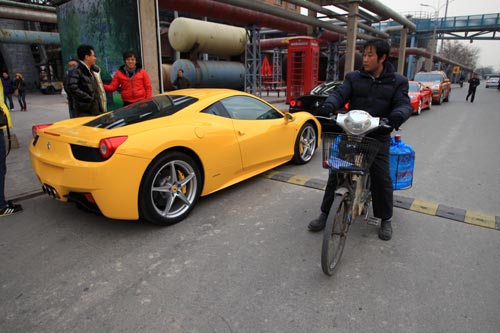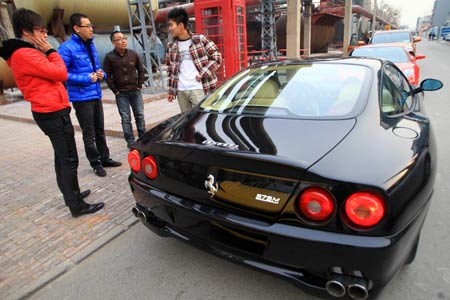Society
Supercar youths in drive for good image
By Li Li (China Daily)
Updated: 2010-12-17 07:51
 |
Large Medium Small |
Checkered future?
 |
|
A cyclist delivering water slows down to admire a Ferrari owned by one of the SCC members. [PHOTOS BY WANG JING / CHINA DAILY] |
In addition to convincing the world not all supercar owners are "spoiled rich kids", Zhang harbors another ambition: to promote a motorsport culture in China.
With car clubs offering fans a gateway into the world of racing, the SCC regularly stages track meets across the country.
Amateur motorsport in China is relatively immature compared to other countries, as most supercar owners just "want to look cool" outside nightclubs, according to Xing Lu, a 38-year-old advertising company boss who owns a Ferrari.
He added: "It's hard to appreciate wine when you never had a cellar, so how do you expect (young people) to really understand sports cars when their parents never had one?"
Like Zhang, organizers at Scuderia Ferrari Club Shanghai, the only Ferrari club in China officially recognized by the Italian automakers, are trying to help develop an appreciation.
Founded in 2005, club members routinely visit Chinese university campuses to promote motorsport among students.
"We advocate motorsport culture, not the culture of wealth," said Zhu Yuhua, founder and chairman of Scuderia Ferrari Club Shanghai. "Motorsport represents the pursuit for dreams, sportsmanship and technology."
No matter how attractive the sport looks, however, Zhang at the SCC cannot remove the fact that fast cars are well beyond the reach of most people's budgets.
"High-end automobiles are sold at least two to three times more expensive in China than they are abroad because of high tax," said Ma Hongguang, a salesman at Beijing's Huaxiang Car Market, the largest second-hand luxury car showroom in North China.
It's a "rich person's game", he said. "Fashionable young buyers always go for the latest model. Money is not an issue for them."
Between them, SCC members own roughly 300 supercars, including limited-edition models made by Maserati, Aston Martin, Pagani and Tramontana. The value of these cars can range from 1.4 million yuan to 30 million yuan ($210,000 to $4.5 million).
And owning a supercar is just the start; there is also fuel and racing costs. According to Goldenport International Circuit in Beijing, drivers need to pay between 1,000 and 10,000 yuan per visit.
To hone his driving skills on the track, Xing paid 300,000 yuan in March to complete the nine-day Pilota Ferrari training program in Beijing and Shanghai. He said that, apart from "a few old men" from Hong Kong and Japan, most of his classmates were Chinese aged 20 to 30 "from rich families".
China is expected to surpass Japan to become the world's largest luxury goods market in the next five years, according to the Chinese Academy of Social Sciences' 2010 Business Blue Book.
One of the sectors constantly expanding is supercars. The number of Ferrari cars delivered to the Chinese mainland alone has trebled since 2005.
"China is a very important market for Ferrari," Edwin Fenech, president and chief executive of Ferrari Asia-Pacific told China Daily. "It is offering the highest growth potential for our business."
Fenech pointed out, however, that the average age of the automakers Chinese customers is 10 to 15 years younger than those in maturer markets.
"Most of my clients are children of rich parents involved in investment, real estate or energy businesses," said Zhou Juan, a Ferrari sales in Beijing. "Chinese parents always give the best to their children."
|
FIRST PERSON LU YI Life in the fast lane
|
Editor's note: Lu Yi, 30, manages Beijing car dealership and is a member of Beijing Supercar Club.
When I was younger, I studied in New Zealand. I got the chance to drive many sports cars there, including a Mazda RX-7, BMW M3, BMW X5 and Jaguar XKR.
As soon as I got back to China I decided to buy a limited edition Ferrari 575M GTC. The car is a true classic. I had posters of the Ferrari 575M GTC on my wall when I was a boy.
After I bought the car, I would sit in my garage and just stare at it for hours. I couldn't believe I really owned it.
It's like secretly being in love with a girl for 10 years and then suddenly, one day, she's yours.
The great thing about the Beijing Supercar Club is that other members share the same passion for cars. We have shared interests and similar lifestyles, so it's easier for us to all hang out together. We relate.
We hold parties and dinners, and we also go to car shows. At the Auto China 2010 event in Beijing last April, club members took 60 supercars that outshined the actual exhibits. It was an interesting parking lot.
And you should have seen my wedding fleet when I got married in August this year. Friends from the club came driving the top brands; Rolls-Royce, Lamborghini, Ferrari, they were all there.
It was amazing and I didn't have to spend a penny.
Lu Yi was talking to Li Li.
